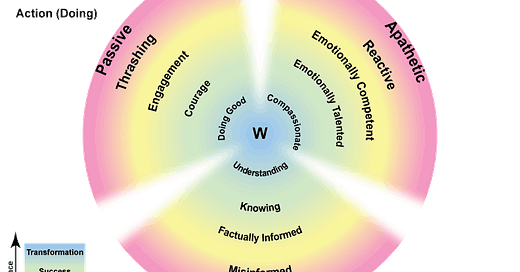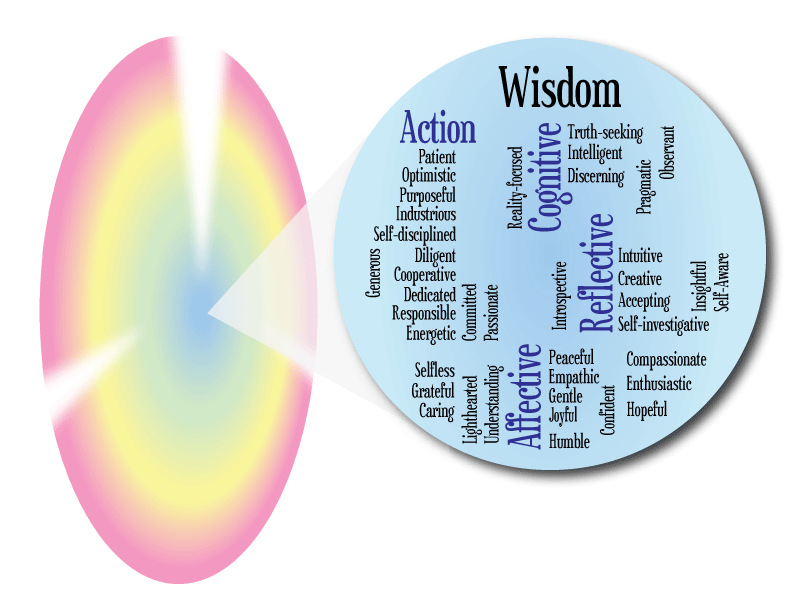Am I acting wisely now? How wise a person am I? What can I do to increase my wisdom? These are basic questions we all face while trying to navigate through life, increase our significance, and act more wisely. Fortunately there is a map that can help us find ourselves in wisdom space. The guides linked from the figure below can help lead us as we work to increase our wisdom.
Wisdom requires progression in clear thinking, committed action, and emotional regulation. As we develop and increase our learning and maturity our focus can shift from survival, to success, and eventually to transformation.
We are born essentially unaware of the wonderful world we live in. As infants and young children, we learn quickly about our world, but see such a small slice we are almost entirely misinformed about theworld.
Eventually our curiosity is armed with language, reasoning, exploration opportunities, number skills, and reading skills. Now we can ask our own questions and seek our own answers. We begin to become factually informed, at least in those areas where our curiosity takes us and we can find reliable answers to our questions. But this realm is still treacherous. Certain questions are off limits, myths and traditions may present falsehoods as facts, trusted people may disagree on the answers to certain questions, or we may accept the first answer we hear. Formal schooling, self study, adventures, and life experiences combine to increase our information base. Some of that information is factual, and some is false, incomplete, invalid, or misleading.
Clear and critical thinkers eventually develop their own theory of knowledge to help them decide what to believe in the face of incomplete or misleading answers and conflicting information sources. Here the rules of evidence, logic, inference, and critical thinking begin to take shape. The ability to integrate information and “connect the dots” to get a larger and consistent understanding of the world becomes important. Falsehoods and fallacies become easier to detect and reject. Inconsistencies become apparent and careful investigation begins to reveal larger and more durable truths about our fascinating world. We are better able to assimilate diversity, learn from ambiguity, suspend judgment, and become comfortable with complexity. These skills allow us to integrate factual information with our own investigations, knowledge base, and world view as we begin to truly know the world for ourselves.
Increasing maturity along three paths: thinking, feeling, and doing, moves us toward wisdom.
When we can reflect on our reliable and broad knowledge, exercise good judgment, and apply it to solve significant problems to enhance human well-being we begin to understand the world as it is. Examining knowledge from multiple viewpoints, adopting a global perspective and long-term view, understanding interrelationships, and gaining insight all contribute to our holistic understanding of the world. Being curious about what happened, creative about what can happen, and open to new possibilities allows us to make surprisingly good decisions that benefit all.
Holistic understanding brings us to the threshold of wisdom, but these thinking skills still need to be accompanied by a similar level of maturity in both action and emotion.
We are born fussy but largely passive, able only to cry and wiggle and we must rely on others to feed us, move us, protect us and care for us. We eventually learn to roll over, crawl, walk, and then run. We can now move, but we travel in small circles, repeat actions endlessly, and our thrashing around does not seem to accomplish anything more than pass time as we entertain ourselves and perhaps our parents and friends.
Eventually we form goals and we focus and engage our actions to meet those goals. These goals may be modest and self-centered requiring little action, or we may set bolder goals to learn, gain strength, achieve, and help others.
As we begin to explore more of the world, we see opportunities that can only be seized by taking more risks. We can go away to summer camp or stay home. We can go far away to a challenging college ideally suited to us or play it safe and stay near home. We can seek a challenging job or tolerate a boring one. We either decide to yield to temptation and avoid taking risks, or we summon the courage to act on our values and do what we believe is right, despite the temptations of an easier path. Running a marathon, graduating from college, job interviews, serious relationships, and studying for tomorrow’s test all require us to leave comfort behind to attain a greater outcome. Achievement requires courage.
But climbing a mountain or completing a marathon are personal achievements that don’t do much to move the world forward. Action must be combined with well-chosen, human-based values to make a significant difference. Courageous achievements that help others around the globe for all time is wisdom in action. When Rosa Parks kept her bus seat and Martin Luther King Jr. organized and sustained the Montgomery Bus Boycott their actions created substantial and lasting progress for all people. This is doing good.
But unless our hearts are in this thinking and doing are not enough; emotional growth is an essential, and often neglected, path toward wisdom. Newborn babies cry endlessly as they know and care only about themselves. They have no empathy for others—they are apathetic. Soon infants learn to reflect the smile on their mother’s face, and react simply and predictably to other’s facial expressions, movements, fears, frustration, and pain. While raw and immediate reactions to emotions represent a growth stage for infants, this reactive behavior is immature, destructive, and unacceptable in adults. Violent tirades, hateful actions, spiteful revenge, humiliation, and ego rants have no wise place among responsible adults. Emotionally competent adults develop the essential social skills to recognize, interpret, and respond constructively to emotions in themselves and others. Understanding and impulse control allows reason to prevail over passion as we regulate and interpret our emotions. With study and practice we can each become emotionally competent.
Fortunately some people are emotionally talented—they are gifted with a special aptitude for interpersonal skills, or they learn emotional competency at an early age and practice it all their lives. They seem to know exactly what to say or do to bring out the best in each of us, comfort us during times of distress, and quickly reach a rapport even with total strangers. These are the warm and charismatic people among us who often excel at counseling professions.
A few people have dedicated their lives to achieving compassion. One example is Dr. Matthieu Ricard who is a molecular geneticist, Buddhist monk, author, translator, and photographer sometimes described as the happiest person in the world. He was a volunteer subject in studies on happiness performed at the University of Wisconsin-Madison, scoring significantly beyond the average obtained after testing hundreds of other volunteers. He radiates calm and compassion.
The long path toward holistic understanding, action for doing good, and compassion bring us to the threshold of wisdom. What lies inside this rarefied region?
Wisdom is action directed by the highest levels of cognitive, reflective, and affective skills.
Wisdom emerges from the fusion of thinking, feeling, and acting at their highest levels of maturity. Cognitive skills require an intelligent, knowing, and pragmatic observer. Reflection requires introspection and intuition based on a true and deep understanding of the world and human-based values. Affective skills require a gentle peace, compassion, and understanding based on empathy for others. This deep thought, reflection, and feeling is expressed through action that is always committed, passionate, and generous.
Find yourself on this map—on each of the three tracks—and take steps to advance along the paths toward wisdom. You can take creative and courageous action to solve problems, create opportunity, and increase the well-being of all.
I hope this series of articles make you wiser. I would enjoy seeing your comments about the articles, and especially your suggestions for improving them.
This essay is available as an 8 1/2 x 11" pdf file or as an 11 x 17" pdf file, convenient for printing




